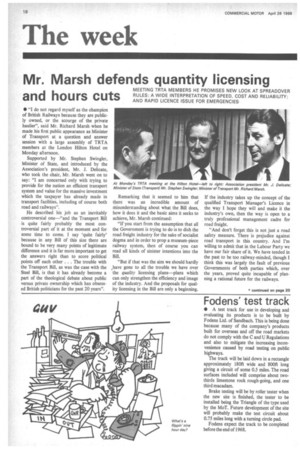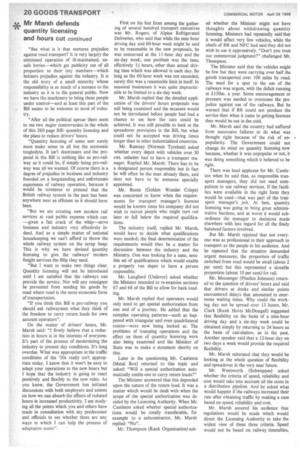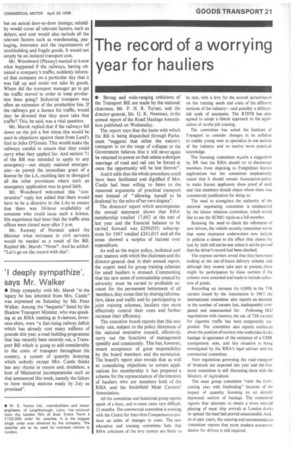Mr. Marsh defends quantity licensing and hours cuts
Page 20

Page 22

Page 23

If you've noticed an error in this article please click here to report it so we can fix it.
MEETING TRTA MEMBERS HE PROMISES NEW LOOK AT SPREADOVER RULES; A WIDE INTERPRETATION OF SPEED, COST AND RELIABILITY; AND RAPID LICENCE ISSUE FOR EMERGENCIES • "I do not regard myself as the champion of British Railways because they are publicly owned, or the scourge of the private haulier", said Mr. Richard Marsh when he made his first public appearance as Minister of Transport at a question and answer session with a large assembly of TRTA members at the London Hilton Hotel on Monday afternoon.
Supported by Mr. Stephen Swingler, Minister of State, and introduced by the Association's president, Mr. J. Delicate, who took the chair, Mr. Marsh went on to say: "I am concerned only with trying to provide for the nation an efficient transport system and value for the massive investment which the taxpayer has already made in transport facilities, including of course both road and railways".
He described his job as an inevitably controversial one—"and the Transport Bill is quite fairly probably the most controversial part of it at the moment and for some time to come. I say 'quite fairly' because in any Bill of this size there are bound to be very many points of legitimate difference and it is far more important to get the answers right than to score political points off each other . . . The trouble with the Transport Bill, as was the case with the Steel Bill, is that it has already become a part of the theological debate about public versus private ownership which has obsessed British politicians for the past 20 years". Remarking that it seemed to him that there was an incredible amount of misunderstanding about what the Bill does, how it does it and the basic aims it seeks to achieve, Mr. Marsh continued: "If you start from the assumption that all the Government is trying to do is to dish the road freight industry for the sake of socialist dogma and in order to prop a museum-piece railway system, then of course you can read all kinds of sinister intentions into the Bill.
"But if that was the aim we should hardly have gone to all the trouble we have over the quality licensing plans—plans which can only strengthen the efficiency and image of the industry. And the proposals for quality licensing in the Bill are only a beginning.
If the industry takes up the concept of the qualified Transport Manager's Licence in the way I hope they will and make it the industry's own, then the way is open to a truly professional management cadre for road freight.
"And don't forget this is not just a road safety measure. There is prejudice against road transport in this country. And I'm willing to admit that in the Labour Party we have our fair share of it. We have tended in the past to be too railway-minded, though I think this was largely the fault of previous Governments of both parties which, over the years, proved quite incapable of planning a rational future for the railways. "But what is it that nurtures prejudice against road transport? It is very largely the continued operation of ill-maintained, unsafe lorries—which get publicity out of all proportion to their tiny numbers—which bolsters prejudice against the industry. It is the old story of a small minority whose responsibility is as much of a menace to the industry as it is to the general public. Now we have the machinery to bring these people under control—and at least this part of the Bill seems to be welcome to most of industry.
"After all the political uproar there seem to me two major controversies in the whole of this 260-page Bill: quantity licensing and the plans to reduce drivers' hours.
"Quantity licensing of some sort surely must make sense to all but the economic troglodyte. It isn't doctrinaire and the proposal in the Bill is nothing like as pro-railway as it could be, if simply being pro-railway was all we wanted. Of course there is a degree of prejudice in business and industry founded on a longstanding and unfortunate experience of railway operation, because it would be nonsense to pretend that the British railway system in the past has been anywhere near as efficient as it should have been.
"But we are creating new modern rail services at vast public expense which can —given a fair crack of the whip—serve business and industry very effectively indeed.. And as a simple matter of national housekeeping we can't afford to throw the whole railway system on the scrap heap. This is why we have devised quantity licensing to give the railways' modern freight services the fillip they need.
"But I want to make two things clear. Quantity licensing will not be introduced until I am satisfied that the railways can provide the service. Nor will any consignor be prevented from sending his goods by road where road is the most economic form of transportation.
"If you think this Bill is pro-railway you should ask railwaymen what they think of the freedom to carry return loads for own account operators".
On the matter of drivers' hours, Mr. Marsh said: "I firmly believe that a reduction in hours is in the interests of everyone. It's part of the process of modernizing the industry to present day conditions. It's long overdue. What was appropriate in the traffic conditions of the '30s really isn't appropriate today. I know that it won't be easy to adapt your operations to the new hours but I hope that the industry is going to react positively and flexibly to the new rules. As you know, the Government has initiated discussions with both employers and unions on how we can absorb the effects of reduced hours in increased productivity. I am studying all the points which you and others have made in consultation with my predecessor and officials to see whether there are any ways in which I can help the process of adaptation easier". First on his feet from among the gathering of several hundred transport executives was Mr. Rogers, of Alpine Refrigerated Deliveries, who said that while the nine-hour driving day and 60-hour week might be said to be reasonable in the new proposals, he was concerned at the 11-hour day and the six-day week; one problem was the time,
effectively hours, other than actual driving time which was allowed in each day. So long as the 60-hour week was not exceeded, surely this was a reasonable limit in itself. In seasonal businesses it was quite impracticable to be limited to a six-day week.
Mr. Marsh replied that the detailed application of the drivers' hours proposals was still being examined and the measure would not be introduced before people had had a chance to see how the cuts could be achieved. It was still possible to look at the spreadover provisions in the Bill, but what could not be accepted was driving times longer than in other industrialized countries.
Mr. Rarnsay (Normeir Tyrebait) asked whether every depot with vehicles over 30 cwt. unladen had to have a transport manager. Replied Mr. Marsh: There has to be a designated person responsible but in fact he will often be the man already there, and does not have to be someone specially appointed.
Mr. Boote (Golden Wonder Crisps) was concerned to know when the requirements for transport manager's licences would be known since his company did not wish to recruit people who might turn out later to fall below the required qualifications.
The industry itself, replied Mr. Marsh, would have to decide what qualifications were needed; the final detenniniation of the requirements would then be a matter for discussion between the industry and the Ministry. One was looking for a sane, sensible set of qualifications which would enable a properly run depot to have a person responsible.
Mr. Langford (Unilever) asked whether the Minister intended to re-examine sections 67 and 68 of the Bill to allow for back-loading.
Mr. Marsh replied that operators would only need to get special authorization from one end of a journey. He added that the complex operating patterns—such as happened with triangular and even quadrilateral routes—were now being looked at. The problems of tramping operations and the effect on them of quantity licensing were also being examined and the Minister of State was to make a statement shortly on this.
Later in the questioning Mr. Castleton (Metal Box) returned to this topic and asked: "Will a special authorization automatically entitle one to carry return loads?"
The Minister answered that this depended upon the nature of the return load. It was a matter which would be dealt with when the scope of the special authorization was decided by the Licensing Authority. When Mr. Castleton asked whether special authorizations would be totally transferable, for example to a subcontractor, Mr. Marsh replied: "No".
Mr. Thompson (Rank Organisation) ask ed whether the Minister might not have thoughts about withdrawing quantity licensing. Ministers had repeatedly said that it would affect very few vehicles, while the chiefs of BR and NFC had said they did not wish to use it oppressively. "Don't you trust our commercial judgment?" challenged Mr. Thompson.
The Minister said that the vehicles might be few but they were carrying over half the goods transported over 100 miles by road. The need for a spur to the use of the railways was urgent, with the deficit running at £150m. a year. Some encouragement or pressure was needed to overcome the prejudice against use of the railways. But he warned that if BR could not produce the service then when it came to getting licences they would be out in the cold.
Mr. Marsh said the country had suffered from successive failures to do what was thought right because of the risk of unpopularity. The Government could not change its mind on quantity licensing now because, whether it was unpopular or not, it was doing something which it believed to be right.
There was loud applause for Mr. Castleton when he said that, as responsible transport managers, they did not need compulsion to use railway services. If the facilities were available in the right form they would be used—that was part of the transport manager's job. At best, quantity licensing was going to bring great administrative burdens; and at worst it would subordinate the manager to decisions made elsewhere with less regard for all the finely balanced factors involved.
But Mr. Marsh rejoined that not everyone was as professional in their approach to transport as the people in his audience. And he repeated that the situation demanded urgent measures; the proportion of traffic switched from road would be small (about 2 per cent) but this represented a sizeable proportion (about 10 per cent) for rail.
Mr. Messenger (Pinchin Johnson) returned to the question of drivers' hours and said that drivers at docks and similar points encountered delays that amounted to enormous waiting times. Why could the working day not be spread over 13 hours. Mr. Clark (Rank Hovis McDougall) suggested that flexibility on the basis of a nine-hour driving day and a six-day week could be obtained simply by returning to 24 hours as the basis of calculation, as in the past. Another speaker said that a 12-hour day on two days a week would provide the required flexibility.
Mr. Marsh reiterated that they would be looking at the whole question of flexibility and spreadover in the very near future.
Mr. Wentworth (Schweppes) asked whether the criteria of speed, reliability and cost would take into account all the costs in a distribution pipeline. And he asked what would happen if the railways increased their rate after obtaining traffic by making a case based on speed, reliability and cost.
Mr. Marsh assured his audience that regulations would be made which would direct the Licensing Authority to take the widest view of these three criteria. Speed would not be based on railway timetables, but on actual door-to-door timings; reliability would cover all relevant factors, such as delays; and cost would also include all the relevant factors such as warehousing, packaging, insurance and the requirements of stockholding and fragile goods. It would not simply be an isolated transport cost.
Mr. Woodward (Plessey) wanted to know what happened if the railways, having obtained a company's traffic, suddenly informed that company on a particular day that it was full up and could not take its goods. Where did the transport manager go to get his traffic moved in order to keep production lines going? Industrial transport was often an extension of the production line. If the railways got a licence for traffic, would they be directed that they must take that traffic? This, he said, was a vital question.
Mr. Marsh replied that if the railways fell down on the job a few times this would be used in objections against them from Land's End to John O'Groats. This would make the railways careful to ensure that they could carry what they applied for. And section 71 of the Bill was intended to apply to any emergency—not simply national emergencies—to permit the immediate grant of a licence by the LA, enabling him to disregard all the other provisions where such an emergency application was in good faith.
Mr. Woodward welcomed this "constructive" reply but added that there would have to be a directive to the LAs to ensure that there was 24-hour availability of someone who could issue such a licence. His experience had been that the traffic area offices were closed soon after 5 p.m.
Mr. Ramsey of Norrneir asked the Minister what increases in civil servants would be needed as a result of the Bill. Replied Mr. Marsh: "None". And he added: "Let's go on the record with this".




















































































































